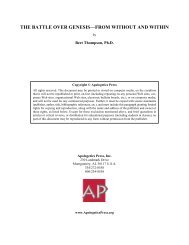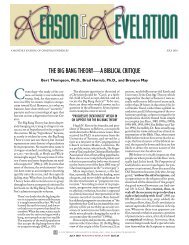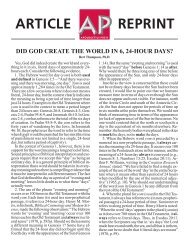The Many Faces, and Causes, of Unbelief - Apologetics Press
The Many Faces, and Causes, of Unbelief - Apologetics Press
The Many Faces, and Causes, of Unbelief - Apologetics Press
Create successful ePaper yourself
Turn your PDF publications into a flip-book with our unique Google optimized e-Paper software.
was the intended polemic target <strong>of</strong> agnosticism.<br />
<strong>The</strong> suspension <strong>of</strong> judgment on ultimate questions<br />
for which it called was thought to invalidate Christian<br />
beliefs about “things hoped for” <strong>and</strong> “things not<br />
seen....” Huxley himself certainly rejected as outright<br />
false—rather than as not known to be true or false—<br />
many widely popular views about God, his providence,<br />
<strong>and</strong> man’s posthumous destiny... (1997a, 1:<br />
151; 1997b, 26:569, emp. added).<br />
Rather than courageously embrace <strong>and</strong> defend atheism,<br />
Huxley opted to feign ignorance with his “I don’t know, you<br />
don’t know, nobody knows, <strong>and</strong> nobody can know” position.<br />
This cowardly compromise did not endear him to those<br />
who were quite willing to champion the more radical stance<br />
<strong>of</strong> apodictically affirming that God does not exist. In their<br />
discussion <strong>of</strong> agnosticism under the section on “religious <strong>and</strong><br />
spiritual belief systems,” the editors <strong>of</strong> Encyclopaedia Britannica<br />
noted that<br />
Huxley <strong>and</strong> his associates were attacked both by enthusiastic<br />
Christian polemicists <strong>and</strong> by Friedrich Engels,<br />
the co-worker <strong>of</strong> Karl Marx, as “shame-faced<br />
atheists,” a description that is perfectly applicable<br />
to many <strong>of</strong> those who nowadays adopt the more<br />
comfortable label (1997b, 26:569, emp. added).<br />
<strong>The</strong> fact is, the agnostic is far from indifferent. He takes his<br />
agnosticism extremely seriously when he affirms that nothing<br />
outside <strong>of</strong> the material world can be known or proved.<br />
But agnosticism is built upon a self-defeating premise. English<br />
philosopher Herbert Spencer (also a close personal friend<br />
<strong>of</strong> Charles Darwin, the man from whom Darwin borrowed<br />
his now-popular phrase, “survival <strong>of</strong> the fittest,” <strong>and</strong> popularly<br />
regarded as one <strong>of</strong> the foremost apostles <strong>of</strong> agnosticism<br />
in his day) advocated the position that just as no bird ever has<br />
been able to fly out <strong>of</strong> the heavens, so no man ever has been<br />
able to penetrate with his finite mind the veil that hides the<br />
mind <strong>of</strong> the Infinite. This inability on the part <strong>of</strong> the finite<br />
(mankind), he concluded, prevented any knowledge <strong>of</strong> the<br />
Infinite (God) reaching the finite.<br />
-18

















